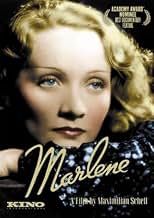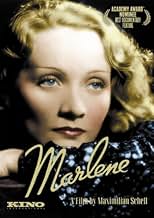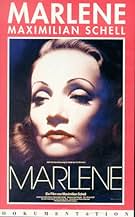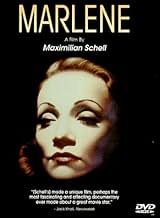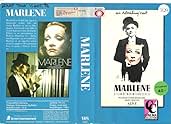Adicionar um enredo no seu idiomaRetrospective on the career of enigmatic screen diva Marlene Dietrich.Retrospective on the career of enigmatic screen diva Marlene Dietrich.Retrospective on the career of enigmatic screen diva Marlene Dietrich.
- Direção
- Roteiristas
- Artistas
- Indicado a 1 Oscar
- 5 vitórias e 2 indicações no total
- Direção
- Roteiristas
- Elenco e equipe completos
- Produção, bilheteria e muito mais no IMDbPro
Avaliações em destaque
Yet, HERE! Perhaps the most intimate documentary ever filmed.
An 82-year old legend who refuses to be photographed, yet whose voice alone raises hackles, cackles and longing over a brilliant assemblage of stock and custom footage.
As much as anything, "Marlene" is a film about trying to film somebody: trying to know somebody.
"Nein, nein, nein," it begins. "No, no no," Marlene instantly dismisses us and this documentary.
Its last word, from Dietrich's own lips, finally resigned, crying softly, is, "Maybe." One of the most haunting, heartbreaking films ever made.
Never has there been as deep a glance into any other screen Goddess' life as this.
Ironic. The most private, iconic of early screen actresses, extends her career for nearly sixty years -- including live performances around the world (unlike, say, Greta Garbo) and culminates in one of the more enigmatic yet fulfilling performances of the century with her voice alone in "Marlene." Thanks solely to Maximillian Schell, whose genius as a film maker rose to Dietrich's genius as a tart risen to lady and finally to goddess.
"Maybe." Indeed.
An 82-year old legend who refuses to be photographed, yet whose voice alone raises hackles, cackles and longing over a brilliant assemblage of stock and custom footage.
As much as anything, "Marlene" is a film about trying to film somebody: trying to know somebody.
"Nein, nein, nein," it begins. "No, no no," Marlene instantly dismisses us and this documentary.
Its last word, from Dietrich's own lips, finally resigned, crying softly, is, "Maybe." One of the most haunting, heartbreaking films ever made.
Never has there been as deep a glance into any other screen Goddess' life as this.
Ironic. The most private, iconic of early screen actresses, extends her career for nearly sixty years -- including live performances around the world (unlike, say, Greta Garbo) and culminates in one of the more enigmatic yet fulfilling performances of the century with her voice alone in "Marlene." Thanks solely to Maximillian Schell, whose genius as a film maker rose to Dietrich's genius as a tart risen to lady and finally to goddess.
"Maybe." Indeed.
10Signet
Schell turns Dietrich's refusal to appear on-camera for him from what could have been a disaster to a distinct artistic advantage. Being able only to hear her growl her own commentary over scenes from earlier films, newsreels, etc., gives this picture an amazing power and poignancy that it would not have otherwise. An amazing movie.
"You won't believe it but the lady is extremely funny" (Maximilian Schell on Marlene Dietrich)
September 1982, the Paris apartment of Marlene Dietrich...contracted for "40 hours of talking," the 81 year-old movie star at last agreed to take part in the documentary about her phenomenon. Mixed feelings, various expectations, surprises or disappointments: contradictory emotions turn up in viewers of this! Ms Dietrich reluctantly talks to Maximilian Schell, the most successful actor of German background in Hollywood. The two know each other thanks to their collaboration in the historic JUDGEMENT OF NUREMBERG 21 years earlier under the direction of Billy Wilder. Both became the expiating conscience for the post war period in motion picture industry. And both Marlene and Maximilian know that. Yet, after all these years, what pays off is getting to know the legendary movie star and encourage her to talk about MARLENE naturally. At this point she is too modest, aging, reclusive, very much to the point in her answers and too practical to praise her own heyday. Just talk. However, it appears that this little may appear too much for a great movie star. If people expect Ms Dietrich to reveal much of herself, they had better put aside this illusion. Nevertheless, among many of the documentaries, MARLENE stands on its own being a must see for her fans. Why?
Because of its wonderfully specific style! As a matter of fact, all the aspects that have been criticized about the movie are its main pluses. Critical viewers are usually too much closed within the world of 'clear, linear presentation.' When something sophisticated comes, they tend to misinterpret. Soon we realize that it is not a conventional documentary about a celebrity but an absorbing chain of interaction, sometimes contradictory, impolite, absurd, quarrelsome interaction seemingly unendurable for an ordinary 'watcher.' It is all like a puzzle of hardly any information and viewers may easily be confused where the talks lead us. But isn't every human being a sort of puzzle which may only be harmed by 'conventions?'
Considering Marlene's undeniably strong personality, along with the director Maximilian Schell, we try to figure out the personality, the phenomenon of the silver screen star who obstinately does not let anyone into her private life which has always been, as she puts it, 'completely separated from her professional life.'
This time, she deliberately fails to do what the director says. The fact we do not see their faces but only hear their voices supplies us with inevitable imagination and empathy. To a greater extent, we are with Mr. Schell whose pursuits and patience influence us and make us look forward to the climactic encounter with the star's personality. Despite its chaotic moments and highly unconventional style of a documentary, the whole puzzle becomes meaningful only with the patience of the director and the patience of the viewers. Therefore, MARLENE meets such radical and extreme impressions. Here Ms Dietrich is hardly clear to understand, a hardly likable creature who smiles at everyone, accepts every view and nods like a politically correct 'parrot' She is not 'exciting' forget it! (that is not what she was contracted to be). She is honest about the hard work that the 'snotty kid' inevitably needed for the success; she is no dreamer with sentimental, 'kitschy' feelings; she is not fond of past; she is no 'amateur improviser' but a very practical woman who seems to have known the business as hardly anyone has. Most importantly, she is herself at the grave of her career and the twilight of her life...still before... revealing to us the timelessly high standards in art and style.
That is why, Schell's MARLENE being least conventional makes it a documentary she truly deserved (paradoxically so reluctant from her side). But let me highlight one more thing that appears of highest importance when you see this documentary. That is Ms Dietrich's striking modesty and practical attitude when she reacts to Schell's 'comments' on her films and certain scenes.
Alfred Hitchcock, having worked with Marlene Dietrich on his STAGE FRIGHT, said a very simple, yet an extremely meaning sentence about her: "She is a professional." Here lies the key to understanding her persona. Although she is sometimes so pretentious while talking to Mr. Schell, her ideas are deeply rooted in her very professional attitude. She is not happy about being shown the things she had done. Consider her notes on certain people she had collaborated with, in particular Orson Welles, Burt Bacharach, Fritz Lang and, foremost, Josef Von Sternberg. Moreover, her 'interpretation' of the scenes she had played, including the ones in MOROCCO, DISHONEST and THE SCARLETT EMPRESS are purely constructive and objective with the healthy distance and criticism. With this true professionalism comes her modesty: "I was an actress. I made films. Period." Elsewhere, she denies her sex appeal and erotic magnetism evoked in certain films. Enigmatic?...Complexed?....Reclusive?....Sad? ....
"...I meant no harm!" We meant no harm! Our curiosity has led us all to a dangerous spot, to the encounter with melancholy and emotions. Nevertheless, Ferdiand Freiligrath's poem allows us all for a genuine tear, something all human beings, no matter if great cinema stars or simple viewers, deserve. A moment of Human Phenomenon for humans who should 'love as long as love they can.'
No 'blind idolatry' but a very realistic glimpse of Marlene who had her significant moment in the cinema history and won world acclaim. 8/10
September 1982, the Paris apartment of Marlene Dietrich...contracted for "40 hours of talking," the 81 year-old movie star at last agreed to take part in the documentary about her phenomenon. Mixed feelings, various expectations, surprises or disappointments: contradictory emotions turn up in viewers of this! Ms Dietrich reluctantly talks to Maximilian Schell, the most successful actor of German background in Hollywood. The two know each other thanks to their collaboration in the historic JUDGEMENT OF NUREMBERG 21 years earlier under the direction of Billy Wilder. Both became the expiating conscience for the post war period in motion picture industry. And both Marlene and Maximilian know that. Yet, after all these years, what pays off is getting to know the legendary movie star and encourage her to talk about MARLENE naturally. At this point she is too modest, aging, reclusive, very much to the point in her answers and too practical to praise her own heyday. Just talk. However, it appears that this little may appear too much for a great movie star. If people expect Ms Dietrich to reveal much of herself, they had better put aside this illusion. Nevertheless, among many of the documentaries, MARLENE stands on its own being a must see for her fans. Why?
Because of its wonderfully specific style! As a matter of fact, all the aspects that have been criticized about the movie are its main pluses. Critical viewers are usually too much closed within the world of 'clear, linear presentation.' When something sophisticated comes, they tend to misinterpret. Soon we realize that it is not a conventional documentary about a celebrity but an absorbing chain of interaction, sometimes contradictory, impolite, absurd, quarrelsome interaction seemingly unendurable for an ordinary 'watcher.' It is all like a puzzle of hardly any information and viewers may easily be confused where the talks lead us. But isn't every human being a sort of puzzle which may only be harmed by 'conventions?'
Considering Marlene's undeniably strong personality, along with the director Maximilian Schell, we try to figure out the personality, the phenomenon of the silver screen star who obstinately does not let anyone into her private life which has always been, as she puts it, 'completely separated from her professional life.'
This time, she deliberately fails to do what the director says. The fact we do not see their faces but only hear their voices supplies us with inevitable imagination and empathy. To a greater extent, we are with Mr. Schell whose pursuits and patience influence us and make us look forward to the climactic encounter with the star's personality. Despite its chaotic moments and highly unconventional style of a documentary, the whole puzzle becomes meaningful only with the patience of the director and the patience of the viewers. Therefore, MARLENE meets such radical and extreme impressions. Here Ms Dietrich is hardly clear to understand, a hardly likable creature who smiles at everyone, accepts every view and nods like a politically correct 'parrot' She is not 'exciting' forget it! (that is not what she was contracted to be). She is honest about the hard work that the 'snotty kid' inevitably needed for the success; she is no dreamer with sentimental, 'kitschy' feelings; she is not fond of past; she is no 'amateur improviser' but a very practical woman who seems to have known the business as hardly anyone has. Most importantly, she is herself at the grave of her career and the twilight of her life...still before... revealing to us the timelessly high standards in art and style.
That is why, Schell's MARLENE being least conventional makes it a documentary she truly deserved (paradoxically so reluctant from her side). But let me highlight one more thing that appears of highest importance when you see this documentary. That is Ms Dietrich's striking modesty and practical attitude when she reacts to Schell's 'comments' on her films and certain scenes.
Alfred Hitchcock, having worked with Marlene Dietrich on his STAGE FRIGHT, said a very simple, yet an extremely meaning sentence about her: "She is a professional." Here lies the key to understanding her persona. Although she is sometimes so pretentious while talking to Mr. Schell, her ideas are deeply rooted in her very professional attitude. She is not happy about being shown the things she had done. Consider her notes on certain people she had collaborated with, in particular Orson Welles, Burt Bacharach, Fritz Lang and, foremost, Josef Von Sternberg. Moreover, her 'interpretation' of the scenes she had played, including the ones in MOROCCO, DISHONEST and THE SCARLETT EMPRESS are purely constructive and objective with the healthy distance and criticism. With this true professionalism comes her modesty: "I was an actress. I made films. Period." Elsewhere, she denies her sex appeal and erotic magnetism evoked in certain films. Enigmatic?...Complexed?....Reclusive?....Sad? ....
"...I meant no harm!" We meant no harm! Our curiosity has led us all to a dangerous spot, to the encounter with melancholy and emotions. Nevertheless, Ferdiand Freiligrath's poem allows us all for a genuine tear, something all human beings, no matter if great cinema stars or simple viewers, deserve. A moment of Human Phenomenon for humans who should 'love as long as love they can.'
No 'blind idolatry' but a very realistic glimpse of Marlene who had her significant moment in the cinema history and won world acclaim. 8/10
A documentary retrospective on the career of enigmatic screen diva Marlene Dietrich.
I do not really know much about Marlene Dietrich. I have seen a few of her better known films, such as "Blue Angel", but know almost nothing about her personally. This documentary was good for fixing that, really allowing her to tell her story in her own words.
Apparently she did not want to be filmed, but agreed to be recorded. I actually think this makes for a better film. It allows for more footage to be shown, which is great when so many of her earlier works are hard to track down. Also, it serves little purpose to show her as an elderly woman... I mean, especially now that we saw how much better the screen time can be used.
I do not really know much about Marlene Dietrich. I have seen a few of her better known films, such as "Blue Angel", but know almost nothing about her personally. This documentary was good for fixing that, really allowing her to tell her story in her own words.
Apparently she did not want to be filmed, but agreed to be recorded. I actually think this makes for a better film. It allows for more footage to be shown, which is great when so many of her earlier works are hard to track down. Also, it serves little purpose to show her as an elderly woman... I mean, especially now that we saw how much better the screen time can be used.
Today I watched a documentary on Marlene Dietrich titled 'Marlene'. It was produced in 1984 and directed by Dietrich's "Judgment at Nuremberg" co-star Maximilian Schell. I don't know how many of you know this, but Marlene agreed to do the film only if the director was in compliance with her wish not to be photographed, and because of this she does not appear in the film. But her Paris apartment is recreated to give the illusion that the actress is really there. Her voice, however, is used as the narration through the film, which is aided with various clips of her movies, concert performances and newsreel footage.
To begin with, Marlene shows little interest in this whole film -- it's obvious -- and even less interest in the discussion of her movies -- that's, sadly, even more obvious. I'm convinced now more than ever that she never enjoyed working on a movie. Still, it's nice to discover that she is able to remember her experiences with a lot of clarity, sometimes using the German word "kitsch" (worthless) to describe most of her film work; although I may disagree with her on some. Marlene also talks about other things besides her films. Her singing career and personal life are briefly discussed, as well as Jean Gabin, Ernest Hemingway, Josef von Sternberg and her marriage to Rudolph Sieber.
It's a strange documentary that you can't help but like. And not everything you would like to hear (even if you consider them important in her life) is mentioned a whole lot in this; such as the war years, where Marlene's tireless efforts to entertain the allied troops stationed at the front, seemed neglected. I remember hearing Schell saying to Marlene in the beginning of the film that he didn't want this to be a typical A-B-C from childhood to present interview. Well, perhaps it would've worked better had it been that way. Much of it was a mess -- not difficult to follow necessarily -- just may have been easier on Marlene's temper had there been some kind of order to the whole thing. Maybe.
It gets a little heated towards the end of the film. Schell seems to have angered Marlene at one point by pressing her for a comment on one of her movies. I don't know how serious it was after the tape stopped rolling, but she evidently wasn't amused. In the end, it becomes apparent to the viewer how cranky Dietrich is at this point in her life. You could argue that it might have something to do with her age, but I think it has more to do with the fact that she was an incredibly disciplined woman who favored manners and intelligence over such common habits like idle gossip and unpreparedness. In fact, her attitude during this film is so overwhelming to the point where it's just sad. She may sound bitter, but she's a woman worth listening to regardless. Watching this documentary gives Riva's book even more credibility, in my opinion, especially in the final years of Dietrich's life where you wonder if all those incidents you read about were true.
To begin with, Marlene shows little interest in this whole film -- it's obvious -- and even less interest in the discussion of her movies -- that's, sadly, even more obvious. I'm convinced now more than ever that she never enjoyed working on a movie. Still, it's nice to discover that she is able to remember her experiences with a lot of clarity, sometimes using the German word "kitsch" (worthless) to describe most of her film work; although I may disagree with her on some. Marlene also talks about other things besides her films. Her singing career and personal life are briefly discussed, as well as Jean Gabin, Ernest Hemingway, Josef von Sternberg and her marriage to Rudolph Sieber.
It's a strange documentary that you can't help but like. And not everything you would like to hear (even if you consider them important in her life) is mentioned a whole lot in this; such as the war years, where Marlene's tireless efforts to entertain the allied troops stationed at the front, seemed neglected. I remember hearing Schell saying to Marlene in the beginning of the film that he didn't want this to be a typical A-B-C from childhood to present interview. Well, perhaps it would've worked better had it been that way. Much of it was a mess -- not difficult to follow necessarily -- just may have been easier on Marlene's temper had there been some kind of order to the whole thing. Maybe.
It gets a little heated towards the end of the film. Schell seems to have angered Marlene at one point by pressing her for a comment on one of her movies. I don't know how serious it was after the tape stopped rolling, but she evidently wasn't amused. In the end, it becomes apparent to the viewer how cranky Dietrich is at this point in her life. You could argue that it might have something to do with her age, but I think it has more to do with the fact that she was an incredibly disciplined woman who favored manners and intelligence over such common habits like idle gossip and unpreparedness. In fact, her attitude during this film is so overwhelming to the point where it's just sad. She may sound bitter, but she's a woman worth listening to regardless. Watching this documentary gives Riva's book even more credibility, in my opinion, especially in the final years of Dietrich's life where you wonder if all those incidents you read about were true.
Você sabia?
- CuriosidadesDirector Maximilian Schell got Marlene Dietrich to agree to appear in this documentary only on the stipulation that she not be photographed as she looked at the time. Instead, we only hear her in interviews.
- Erros de gravaçãoThe documentary states that "Dietrich" was the maiden name of Marlene's mother. This is completely untrue. Wilhelmina Dietrich was born Wilhelmina Felsing. Dietrich was the name of Marlene's biological father, Louis Dietrich, after whose death Wilhelmina married Eduard von Losch, who thereby became Marlene's stepfather.
- Citações
[Last line, to director Maximilian Shell about this film]
Marlene Dietrich: You never sell that in America.
Principais escolhas
Faça login para avaliar e ver a lista de recomendações personalizadas
Detalhes
Bilheteria
- Faturamento bruto nos EUA e Canadá
- US$ 852.676
- Fim de semana de estreia nos EUA e Canadá
- US$ 14.490
- 9 de nov. de 1986
- Faturamento bruto mundial
- US$ 852.676
Contribua para esta página
Sugerir uma alteração ou adicionar conteúdo ausente

